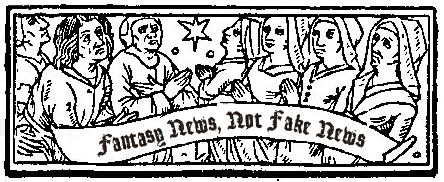Alanna – The First Adventure by Tamora Pierce is the first book in a series of novels depicting the trials of a teenage human female struggling to attain knighthood. It is based on the somewhat amusing notion that humans cannot easily differentiate the genders of children, as the title character pretends to be male in order to achieve knighthood. Although warrior-women are not unheard of in regressive human societies (indeed, they have a term specifically for them: amazons), the path of knighthood is not open to women – perhaps reflecting the notion that genteel human caste positions like squire and chevalier are not simply about combat and tournaments, but about perpetuating family lines and continuing the exclusionary caste system on the basis of birth. The book does attempt, however, to suggest that women – or an adolescent female – can achieve the same proficiency as a man, and many a young human has apparently found affirmation in the pages of this book. Still, one struggles to accept the idea of humans not being able to distinguish gender when their hulking males are nearly as hairy as dwarves (dare I say furry even) and their women are ripe with fleshy protuberances.
A second flaw in this book (which those of ancient races will quickly note) is the racial homogeneity. Pierce, as with so many human authors, struggles to reconcile humanity’s inferiority. In this case, not only are all the main characters human, but – in fact – there are no members of the venerable races present in any book in the series. Pierce invents a medieval world of myth and magic without elves, dwarves, or even hobbits. This is the only way in which Pierce can create a human hero – by excluding those races that consistently overshadow humans in the real world. One might even suggest that Pierce feels threatened by the goblinoid races, who make no appearances in this world either.
While The First Adventureis a text that will only appeal to human readers or philanthropes, it seems to make important headway in human literature. This is no bildungsroman; Alanna is a hard-headed noble youth. She refuses to accept society (or its norms), instead either rebuffing that which does not interest her or forcing (courtly) society to accept her through her mastery of the skills of knighthood. It is not a romance – there is no tale of maidens seeking rescue here. Instead, the young woman refuses help in all but the most dire circumstances in order to prove herself. Moreover, she rejects those familiar romantic tropes and intrigues. There is little focus on love or boys; they are mere distractions. There is no focus on sisterhood. At every opportunity, Alanna spurns, curses, or hides her femininity. For these reasons, young human females have found it a popular read for many decades.








